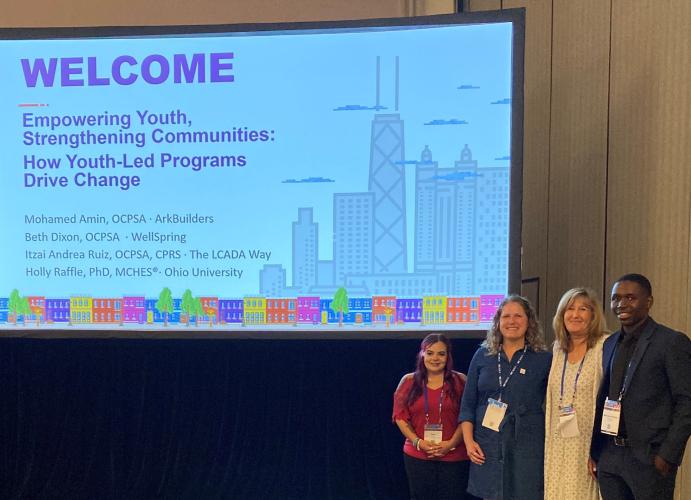
Training to support youth-led prevention: Ohio Adult Allies celebrates 10 years of workforce development

For Isabella Ruiz, a youth guest on the Ohio Adult Allies podcast, one of the most rewarding aspects of her teenage years was being a part of a youth-led initiative to help address substance use at her school. She credits an adult mentor for encouraging her.
“She saw me speak at a meeting and invited me to join the leadership council,” she says. “Since then, I've spoken confidently to teachers, school board members, and even politicians about prevention issues with a lot more ease.”
Communication is the most critical component of educating Ohio teens to make healthy choices about substance use and mental health. To bolster those efforts, Ohio University’s Voinovich School and Leadership and Public Service partnered with the Ohio Department of Mental Health and Addiction Services (OhioMHAS) and the non-profit Prevention Action Alliance to create the Ohio Adult Allies Initiative (OAAI).
This youth empowerment initiative celebrates its 10th anniversary this year. The Voinovich School supports OAAI’s work by providing workforce development opportunities for adults interested in working with youth to address behavioral health in their schools and communities.
“Young people need that one person in their life to believe that young people can create community change, and often that is an Adult Ally,” says Dr. Holly Raffle, professor of leadership and public service, who leads the school’s community-based prevention efforts. “When young people learn how to do community change, their work can impact their whole school or community.”
Since 2014, the program has expanded to all 88 Ohio counties, organized into eight Regional Learning Collaboratives (RLC) led by youth-led prevention subject matter experts, three of which are funded directly by the Voinovich School through a grant from OhioMHAS. Adult Allies run the gamut from prevention specialists, health department workers, educators, and youth workers to community leaders, all with extensive knowledge of youth-led prevention science and experience guiding young people through the process of creating community-level change. The RLCs are designed to be accessible to those who support youth-led programming across the state and represent a variety of community settings.
While the pandemic moved much of the OAAI online, its return to in-person has allowed the initiative to enhance prior programming. Every year, the Voinovich School partners with others to host statewide training sessions that uplift the research and youth engagement to ensure that the work in Ohio is evidence-based and to create a space for seasoned allies to pass their experience on to new allies. These trainings are more structured events, but the new Connect through Conversation with Ohio Adult Allies implemented in 2023 is a more relaxed opportunity.
“Our statewide training sessions are a little more formal, often providing new content,” says Aimee Collins, a senior research manager at the Voinovich school. “We’re looking to these conversations to be a smaller group of people to ask questions that informally discuss the topic of the day.”
Research shows that community change takes five to seven years to take hold, but the hard work is worth it. Collins points to a recent event where one Adult Ally, who began participating in the program as a young person, became an ally and is now a supervisor guiding a new cohort of staff and young people.
“It was just wonderful to hear them reflect on those experiences,” she says. “It just shows the richness and depth created by the program over the years.”
